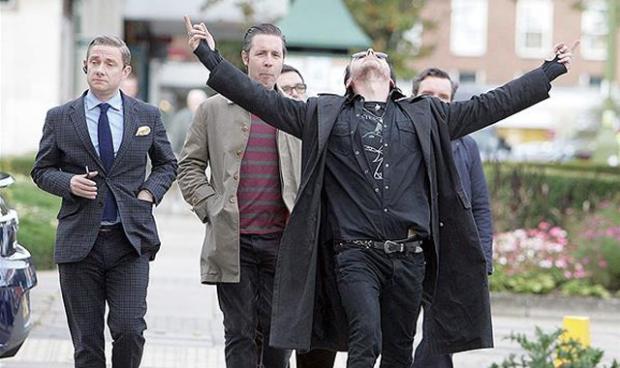A Child is Being Killed by Carolyn Zaikowski
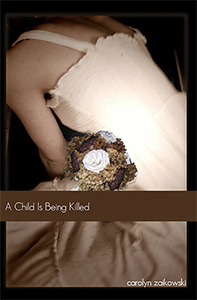 A Child is Being Killed
A Child is Being Killed
by Carolyn Zaikowski
Aqueous Books, 2013
162 pages / $14 Buy from Aqueous Books
A doubling is also a fracture. It’s a breaking apart. Carolyn Zaikowski’s novel A Child is Being Killed knows deeply this violence of the double, enacts it time and again. It’s the site of the book’s hopelessness, but also of its hope.
*
A Child is Being Killed tells the story of Shrap, a teen girl whose father sells her into sexual slavery in exchange for his rival’s business. It’s at least as dark as it sounds. Shrap is imprisoned, beaten, raped, and subjected to scientific experiments. She lives in a world where endlessly repetitive trauma distorts all sense of time and place, an opaque anywhere-dystopia in which sensation and fantasy are all that she can hold on to. A Child is Being Killed is also about escapes, however partial or temporary. It is a book written with grace and passion, and it probably deserves a much more thorough discussion than I’m giving here. Still, I will offer these thoughts as a part of the larger conversation that the novel should generate.
*
The first double/fracture comes in the book’s title. In A Child is Being Killed, the verb ‘to be’ is repeated in different forms. This has a few effects. The wording holds the horror of killing in suspension. A child is being killed. The killing is neither something to happen (therefor stoppable) nor something that has happened (that can be overcome, or at least dealt with). The killing is happening. The book is written under the sign of a horror in process.
And what of the semi-repetition of ‘to be’? The doubling pounds home the fact: This is happening. This cannot be escaped. The cruel truth of the title’s double ‘to be’ is that even if you get rid of one, a child’s still killed. Even if you lose them both you get A Child Killed. At the same time the extra ‘to be’ distances the word ‘child’ from ‘killed’. It gives a gap, and in that displacement there is life with its ever-present hope.
September 3rd, 2013 / 12:55 pm
I Am Sad And Lonely: Notes On Blurbs
The following are my notes for obtaining blurbs, a nearly six-month endeavor, for my novel Daniel Fights a Hurricane. My hope is that this list is a kind of raw/sloppy guide for others reaching out to the same, or similar, authors. Here, maybe, is what to expect.
interesting “In Defense of Brooklyn” post on Montevidayo that talks, among other things, about narrow-minded academics
(kind of an outgrowth of Donald Dunbar’s “But Let’s All Make Out” post that ran on here a while back.)
No End to Things That Are Not Holograms
The company responsible for the Tupac hologram that performed at Coachella last year, Digital Domain Media Group, recently went bankrupt, somehow, despite the millions pouring in from investors, the $400,000 Dr. Dre himself reportedly paid for the puppet Tupac, and funded plans they had to resurrect Elvis as a hologram and possibly pitch holograms to political candidates to deliver virtual speeches this upcoming election.
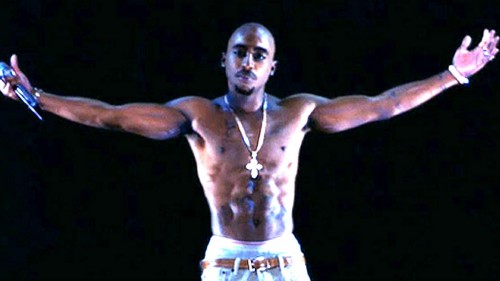
Ok, so Tupac is double dead now, him and his hologram. Sort of. I mean some still insist he is not physically dead, but one thing for certain I feel moved to clarify is that he was never a hologram. Not even remotely close.
The Tupac hologram was simply a high-quality isolated video projection (niced up with 3-D graphics to provide depth cues) on a transparent screen (a sheet of mylar stretched across stage). Not very different, technologically speaking, than what you see when you go to the movies. It was sold as a hologram because it seemed like a free-moving 3-D object “beamed” from some magic device, like what we saw in the first Star Wars movie when Princess Leia sent an image of her bodily form to convey a message to Obi-wan instead of just simply sending a recording of her voice or some writing. (The significance of her using her whole, three-dimensional (but shrouded) body to plead her message, virtually, is a topic for a different article, but of course this fictional technology is already inspiring a robust pursuit at MIT.)
The real name for what you saw in the Tupac trick, or in Gorillaz “live” stage performances of its cartoon members, or in Hatsune Miku, a blue-haired Vocaloid anime girl/voice synthesizer whose songs can be created by users, is the Pepper’s Ghost Illusion, which you have seen if you’ve ever been through the Haunted Mansion at Disneyland. It’s a stage trick involving secret rooms, angled glass and lights that create ghostly images that seem to float and disappear midair. Although mentioned by some news sources, “Pepper’s Ghost Illusion” obviously doesn’t sound as technologically-advanced as “hologram”; in fact, it sounds a little quaint and old-fashioned, which is why marketers haven’t seemed to want to bring it up.
The only reason this misnomer bothers me is that it masks the true facts of real holograms, and the facts are wonderful, more wonderful than the facts of Pepper’s Ghost Illusion. I recently finished writing a whole book inspired by the facts of holograms borne out of an accidental obsession that started when, for no reason I can remember, I looked up holography on Wikipedia. READ MORE >
FC2 is currently accepting submissions to the Ronald Sukenick and Catherine Doctorow Innovative Fiction Prizes. Submissions may include a collection of short stories, one or more novellas, or a novel of any length. The winning manuscripts, to be selected by Matthew Roberson and Sam Lipsyte, will be awarded with cash prizes and publication by FC2. All submissions must be received electronically by 12:00 am (EST) on November 1, 2013. Please visit http://www.fc2.org/prizes.html for contest guidelines and submission instructions.
Why The Troll’s Been Bashing Blake Butler
***
Is the comments thread of a post eulogizing Seamus Heaney the place to be snarky and to attack Blake Butler?
Well my long-time (and still) friend Philip Hopkins thought it was:
“Oh, did Heaney die? I guess that’s cool”
and
“…I thought clarity was outré. Heaney hasn’t written a magnum 700 page spooj-laden opus on tennis and corporate sponsorship has he? Has Blake Butler’s blog lost its edge?”
***
And in reply to those comments ZZZZZIPPP (who only writes in ALL CAPS) asked: “DID BLAKE BUTLER HURT YOU IN SOME WAY” ?? (Perhaps ZZZZZIPPP had also seen Phil’s comment to my post about who is the best tweeter amongst us writers:
“Blake Butler is the best person at everything in the world all the time because he’s so literary. Always. Especially when he’s not.”)
***
To clear the air now (ie, to stop the trolling, silly and embarrassing–and it’s happened before) and because, also, I am sure many people actually agree with his opinions, I asked Phil to flesh out his ideas, passions and grievances in an intelligent, civilized way (while I don’t agree with Phil’s strong positions I’m fine with his having them.) And, so, this, is what he sent me:
by Philip Hopkins
To clarify some of my recent comments on HTMLGIANT.
Blake and Rauan have said on this site and elsewhere that they find ethical considerations trite READ MORE >
notes for a future review of threads by jill magi
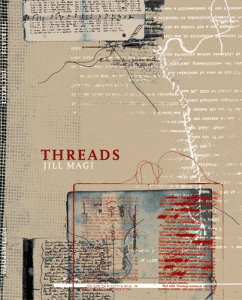 Threads
Threads
by Jill Magi
Futurepoem, 2007
144 pages / $15 Buy from SPD or Amazon
I
Ghosts.
The ghost of the homeland (“isamaa” – fatherland).
The ghost of family history.
The shadow of the self.
Phantom limb:
“the sensation that an amputated or missing limb (even an organ, like the appendix) is still attached to the body and is moving appropriately with other body parts. Approximately 60-80% of individuals with an amputation experience phantom sensations in their amputated limb, and the majority of the sensations are painful. […] The missing limb often feels shorter and may feel as if it is in a distorted and painful position.” 1
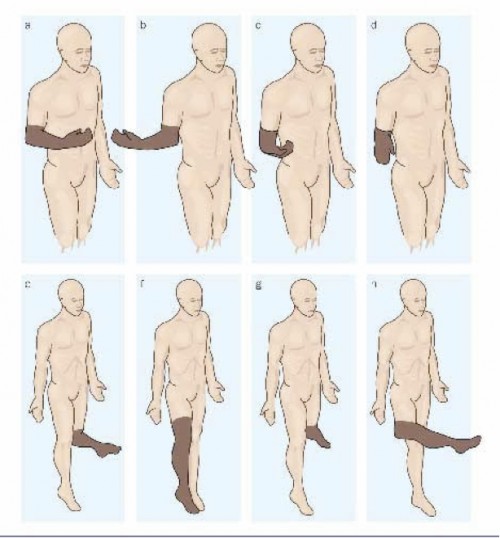
Fig. 1: Illustration of ‘paralyzed’ phantom limb sensations, Phantom Pain by Rebecca Brightwell via AgrAbility in Georgia (http://agrabilityinga.com/phantompain.html)
“most treatments for phantom limb pain […] are ineffective and fail to consider the mechanisms that underline production of the pain.” – Herta Flor, Dept. of Clinical Neuroscience, University of Heidelberg.2
The phantom manuscript.
This is the tale of Magi’s father, told in prose images torn & stitched. Letters, maps: they hint at this other text, this fuller text which serves as the source for the book, but which we never fully see. The father text. The sensation of the story.
II
Father text/fossil text.
The tearing & restitching of the father’s map reconstructed by the daughter as an attempt toward understanding (image on pg 10 etc). Revisions are made; bloodline edits (edits made as we evolve…edits between generation & generation), Magi the writer as both the experiencer & the engineer of her history:
“Engineer precedes father precedes master precedes oneself, even independence[…]” (pg 16).
But also: an overlap of multiple identity. Layering of who you are under who you came from.
The father on the daughter. His image superimposed over her own. This is the true meaning of Americanism: the overlap of heritage (ethnic/local) with “american” identity.
“The meaning of natural.” (pg. 96)
The meaning of being natural. How does the process of editing ones history make history? How does memory spontaneously create itself?
September 2nd, 2013 / 11:05 am
Breaking down the Engine: A Review of Cathy Park Hong’s Engine Empire
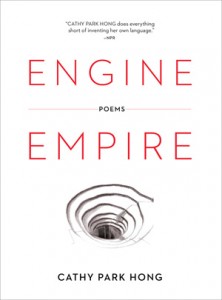 Engine Empire
Engine Empire
by Cathy Park Hong
W. W. Norton & Company, 2012.
96 pages / $15.95 Buy from Norton or Amazon
Today’s political landscape teems with critical topics; the economy, women’s rights and our diplomatic relations with China are but a few. These issues carry catch phrases and slogans that are disseminated to the general public via media and pop culture. We, the public, are inundated with instant clichés at every turn: television, magazines and sometimes even in literature and poetry. However, those of us that enjoy poetry expect subtlety, skill and guile because when it comes to poetry slogans and political banter simply will not do. Enter Cathy Park Hong’s Engine Empire a collection that speaks volumes on “the issues” without declaiming from one single soapbox.
Hong’s latest collection moves through the Civil War era, modern day China and the future as it conveys a startling idea: that human greed, ignorance and apathy are not necessarily resolved by technology but helped along by it.
Engine Empire has received a good amount of praise. The collection is full of imagination and creativity. However, something must also be said about its authenticity and the way in which the book makes its social commentary. The diction in “Ballad of Our Jim,” the first section of the book, is pure Mark Twain. Hong creates music that is unforced, hard at its colloquial best and authentic, “A horse hair tightrope tied from one barrack to another, / and the crowd jeers and rails / til a rouge-doused banker in a stove pipe hat / is pushed from the balcony, trembling against the ledge.” In an interview with the Paris Review Hong described some of her research for the book and for the opening chapter, “I read Zane Gray, Larry McMurtry, Mark Twain, Cormac McCarthy, Faulkner’s Light in August. I had a couple of wonderful Old West dictionaries.”
The aforementioned “Jim,” separated from his family during a raid, is the chapter’s silent protagonist, moving along the frontier with a band of brothers; a rag tag family of gold rush fevered low lives.
so we pluck one boy from the litter,
lure him out with hen fruit and fresh violet marrow.
We pounce him. Christen him Jim.
September 2nd, 2013 / 11:00 am

